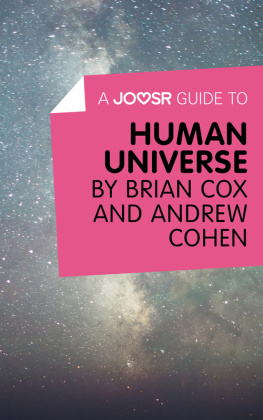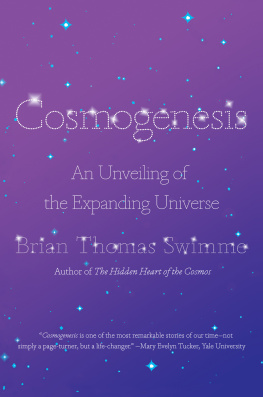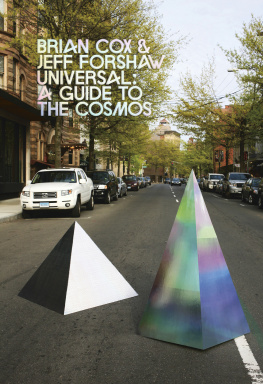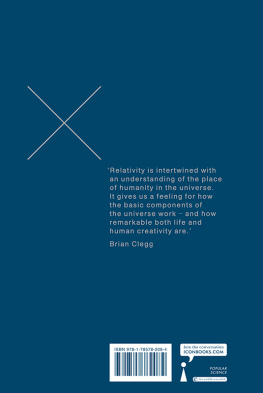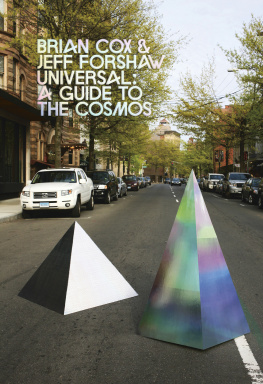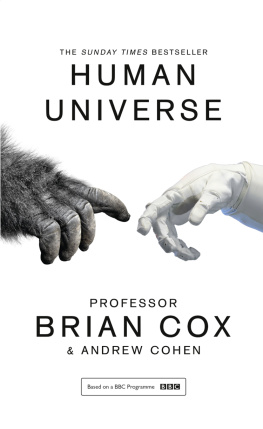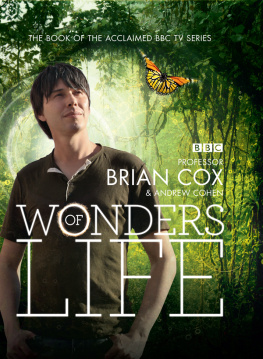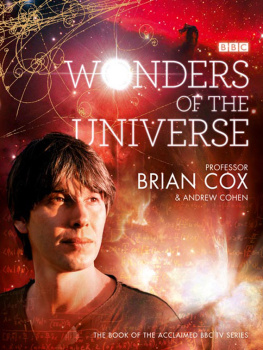HUMAN UNIVERSE
BY BRIAN COX AND ANDREW COHEN

Whats it about?
The universe is vast and complex, and the place we humans have in it isnt exactly clear. We still have so many questions that we struggle to find an answer to, such as who we are, where we are, why we are here, what our future is, and if we are alone in the universe. There may not be exact answers for any of these queries, but with our advances in science and technology we are able to come closer than ever to finding out the truth.
Some of these questions have the beginnings of answers already, but require more study. For instance, science as a whole accepts that humans are the product of evolution, though the cause of this evolution is still being debated. And long ago we discovered that we are not at the center of the universe, but just exactly where in the universe we sit is still being explored. In this search, we may even find intelligent neighbors.
We are now able to peer far into the past, to the Big Bang and what may have preceded it, and well into the future to predict where we are going and how we can ensure our survival. One day our technology may be enough to sustain us indefinitely and allow us to travel and explore to the farthest reaches of space. But in order to do that, we must understand where we are now.
Human Universe is a book about you. Reading it can help you get a better idea of where you came from, why you are here, and where the future of your species lies. These answers may not be exact, and they are certain to change in the future, but they are as good as the current human understanding of the universe allows. They will teach you what a beautiful, terrifying thing it is to be human.
The Earths climate may have made humans who we are today
Humans are the product of evolution. In terms of intelligence, we stand far apart from all the other life on the planet today, and yet we share common ancestors with them all if you look back far enough. Our closest relative on the planet today is the chimpanzee, but even so, our intelligence is far superior to theirs. How did our intelligence evolve so greatly from a common ancestor in order for us to become who we are today?
About 4 million years ago in Africa, our evolutionary family split from that of the chimpanzee into a family known as the hominins that eventually led to us. To date, the oldest-known hominin is Australopithecus afarensis, with a brain size of 500 cubic centimeters (cc), which is not far from that of a chimpanzee. Homo erectus followed 1.8 billion years ago, with a 1,000cc brain; and then Homo heidelbergensis 800,000 years ago with a 1,400cc brainthats pretty much the size of the modern human brain. We, Homo sapiens, appeared around 190,000 or so years ago.
Pinning down the where and when of these evolutionary strides was certainly a feat in itself, but now we want to know why they occurred. And the answer may lie with climate change. Looking back to these periods of evolutionary change, we know that the Earth was at its most elliptical orbit at these times and therefore experiencing great climate variation.
In the Rift Valley, where hominins resided, conditions changed rapidly and often, meaning that everything living there had to adapt to survive. One of the resulting adaptations may in fact have been larger brain size, a feature found in new hominins after each of these climatic changes.
Had hominins lived elsewhere, these brain growths may not have occurred. Basically, our ancestors were fortunate enough to be in the right place at the right time with the right evolutionary response. This theory that climate variation in the Rift Valley caused the evolution of the human brain is known as the Pulse Climate Variability hypothesis.
So who are we? We are Homo sapiens: a product of the exact laws of the universe that allowed the Earth to orbit the Sun in just the right way, and of luck that our ancestors were in the right place to benefit from that orbit. Thanks to the laws of the universe and the luck of the draw, you are the thinking, feeling, doing human being that you are today.
We are a tiny speck in one of countless galaxies in the universe
It has been a long time since we as a civilization thought that our planet occupied the center of the universe. Thanks to Galileo and his telescope, and Isaac Newton and his laws, we developed a solid understanding of the fact that there was much more to the universe than just Earth and its inhabitants as early as the late 1600s. But knowing where we are in our neighborhood of the universe isnt nearly enough to satisfy our curiosity. We want to know where we are in relation to everything. And that question isnt so easily answered.
Humanity certainly took some time to figure out that the Earth wasnt the center of our solar system, but once it did, the discoveries of location just kept on coming. Advances in astronomy and mathematics allowed us to accurately measure the distance between our planet and the stars around us in light years. With this knowledge, we were now able to calculate the size of our galaxy, known as the Milky Way. It is 100,000 light years across, and our Sun is roughly 25,000 light years from the center of this galaxy. Once again we found ourselves outside of the center.
Though we had learned the size of our galaxy, up to the early 1900s we were still unsure about the extent of the universe beyond the Milky Way. Many people were of the opinion that ours was the only galaxy in existence, and no proof could categorically refute this idea until Edwin Hubble took a telltale photo of the Andromeda galaxy in 1923. In Hubbles photo, a new object was identified, which could be used to accurately measure the distance from earth to Andromeda.
That distance turned out to be 900,000 light years. With this discovery, we were able to find new galaxies. Since then, we have been exploring our skies and taking measurements wherever possible. We have found that we are simply a tiny dot in a galaxy surrounded by countless other galaxies, which continue on well past what we can physically observe. In fact, we now estimate that there are approximately 100 billion galaxies in the universe, and perhaps even double that.
So, where are we? Planet Earth, in the solar system, in the Milky Wayone galaxy among many billions. We are painstakingly observing and identifying our closest galaxies, but at best we have only a very, very local map.
The universe is infinite, eternally expanding and generating new Big Bangs
The currently accepted model of the genesis of the universe is the Big Bang theory. This states that about 13.7 billion years ago the known universe exploded into being and has been expanding and cooling ever since. But what we really want to know now is: What caused the Big Bang? What came before our universe exploded into being? With this information, we may come closer to answering the question of why we are here.
Our universe, as far as we can see, is 90 billion light years across. Light is the fastest thing there is, so for the ends of the universe to ever have been in contact, they would have needed much longer than a mere 13.7 billion years to produce a universe of this size. This suggests there was something before our Big Bang, and we look to quantum theory to explain.
Very basically, Quantum theory states that anything that can happen does happen. Anything that the laws of nature will permit will happen, given enough time. One of the things that nature will allow is a scalar field, which can cause space to expand exponentially fast. This expansion is part of the inflationary theory, and it causes the portion of the universe within the scalar field to inflate outward at unimaginable speeds until the field runs out of energy and decays. Once that has occurred, the inflation ends and leftover energy is dumped into particles, which become very dense and end up explodingthats right, in a Big Bang.
Next page
